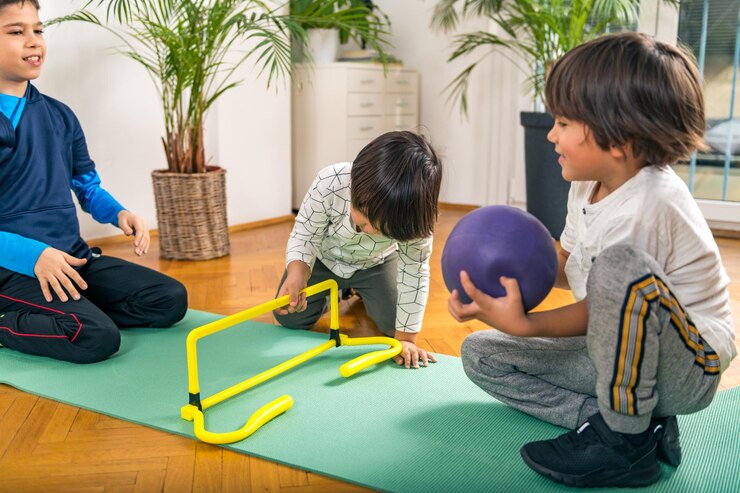How Occupational Therapy Empowers Children with Developmental Delays: A Comprehensive Guide for Parents
As a parent, watching your child struggle with developmental delays can be heart-wrenching. You want the best for them, and you may find yourself searching for ways to help them overcome their challenges and thrive. Occupational therapy (OT) can be a powerful tool in supporting children with developmental delays, providing them with the skills and confidence they need to succeed. In this blog, we’ll explore how occupational therapy supports children with developmental delays, the specific techniques used, and the profound impact it can have on a child’s life.
Understanding Developmental Delays
Developmental delays occur when a child does not reach their developmental milestones at the expected times. These delays can manifest in various areas, including:
- Motor Skills: Difficulties with movement and coordination.
- Speech and Language: Challenges with speaking, understanding, and using language.
- Cognitive Skills: Issues with thinking, learning, and problem-solving.
- Social and Emotional Skills: Struggles with interacting with others and managing emotions.
Developmental delays can be caused by a range of factors, including genetic conditions, premature birth, and environmental influences. Regardless of the cause, early intervention is crucial to support the child’s development and help them achieve their full potential.

What is Occupational Therapy?
Occupational therapy is a form of therapy that helps individuals achieve independence in all facets of their lives. For children, this often involves improving their ability to perform daily activities and participate in school and social settings. Occupational therapists (OTs) work with children and their families to develop personalized treatment plans that address the child’s unique needs and goals.
How Occupational Therapy Supports Children with Developmental Delays
-
Individualized Assessment and Goal Setting
The first step in occupational therapy is a comprehensive assessment to understand the child’s strengths, challenges, and specific needs. This assessment may include:
- Observations of the child in different settings (e.g., at home, school, or during play).
- Interviews with parents, caregivers, and teachers.
- Standardized tests to measure the child’s developmental level.
Based on this assessment, the occupational therapist collaborates with the family to set realistic and meaningful goals. These goals are tailored to the child’s unique situation and focus on improving their functional abilities.
Children with developmental delays often struggle with fine and gross motor skills. Occupational therapy provides targeted interventions to enhance these skills, such as:
- Fine Motor Skills: Activities like drawing, cutting with scissors, and manipulating small objects help improve hand-eye coordination and dexterity.
- Gross Motor Skills: Exercises and activities that involve jumping, climbing, and balance help strengthen large muscle groups and improve overall coordination.
-
Enhancing Sensory Processing
Many children with developmental delays have sensory processing issues, meaning they may be overly sensitive to or under-responsive to sensory stimuli. Occupational therapists use sensory integration techniques to help children process and respond to sensory information more effectively. This might include:
- Sensory Play: Activities that involve different textures, sounds, and movements to help children become more comfortable with sensory input.
- Sensory Diets: Personalized plans that incorporate specific sensory activities throughout the day to help regulate the child’s sensory system.
-
Improving Cognitive and Perceptual Skills
Occupational therapy also focuses on enhancing cognitive and perceptual skills, which are crucial for learning and problem-solving. Therapists use a variety of techniques to support these areas, such as:
- Visual Perception Activities: Puzzles, matching games, and activities that require identifying shapes and colors to improve visual processing.
- Memory and Attention Exercises: Games and tasks that require remembering sequences, following directions, and maintaining focus.
-
Fostering Social and Emotional Development
Social and emotional skills are vital for a child’s overall well-being and ability to interact with others. Occupational therapists help children develop these skills through:
- Social Skills Training: Role-playing, group activities, and social stories to teach appropriate social behaviors and communication techniques.
- Emotional Regulation Strategies: Techniques such as deep breathing, mindfulness, and using visual aids to help children manage their emotions and reactions.
-
Supporting Daily Living Activities
Occupational therapy aims to help children become more independent in their daily lives. This includes teaching skills needed for self-care, school participation, and community involvement. Some areas of focus include:
- Self-Care Skills: Teaching children how to dress, groom, and feed themselves.
- School-Related Skills: Improving handwriting, following classroom routines, and using tools like scissors and rulers.
- Community Participation: Helping children navigate public spaces, interact appropriately with others, and participate in recreational activities.
The Impact of Occupational Therapy on Children with Developmental Delays
The benefits of occupational therapy for children with developmental delays can be profound and far-reaching. Some of the key impacts include:
One of the primary goals of occupational therapy is to help children become as independent as possible. By developing the skills needed for daily living, children gain a sense of autonomy and confidence, which can significantly improve their quality of life.
-
Improved Academic Performance
Children with developmental delays often face challenges in the classroom. Occupational therapy addresses these challenges by developing the skills needed for academic success, such as fine motor skills for writing and cognitive skills for following instructions and solving problems.
-
Enhanced Social Interactions
Social skills are critical for building relationships and participating in group activities. Occupational therapy helps children learn how to interact with peers and adults, fostering friendships and reducing feelings of isolation.
-
Better Emotional Regulation
Managing emotions can be difficult for children with developmental delays. Occupational therapists teach strategies for coping with stress, frustration, and other strong emotions, leading to better emotional regulation and overall mental health.
-
Greater Family Involvement and Support
Occupational therapy often involves educating and supporting families. Therapists work closely with parents and caregivers, providing them with tools and strategies to support their child’s development at home. This collaborative approach ensures that progress made during therapy sessions is reinforced in daily life.
Conclusion
Occupational therapy plays a vital role in supporting children with developmental delays. By addressing the child’s unique needs and providing targeted interventions, occupational therapists help children develop the skills they need to thrive. Whether it’s improving motor skills, enhancing sensory processing, fostering social interactions, or supporting daily living activities, occupational therapy offers a comprehensive approach to promoting a child’s development and well-being.
If you’re a parent or caregiver of a child with developmental delays, consider exploring occupational therapy as a valuable resource. By partnering with a skilled occupational therapist, you can help your child overcome their challenges and reach their full potential. Remember, early intervention is key, and the support and guidance provided by occupational therapy can make a significant difference in your child’s life.
For more information on how occupational therapy can benefit your child, or to schedule a consultation with a licensed occupational therapist, please visit our website or contact us directly. We’re here to support you and your family on this journey toward growth and development.

